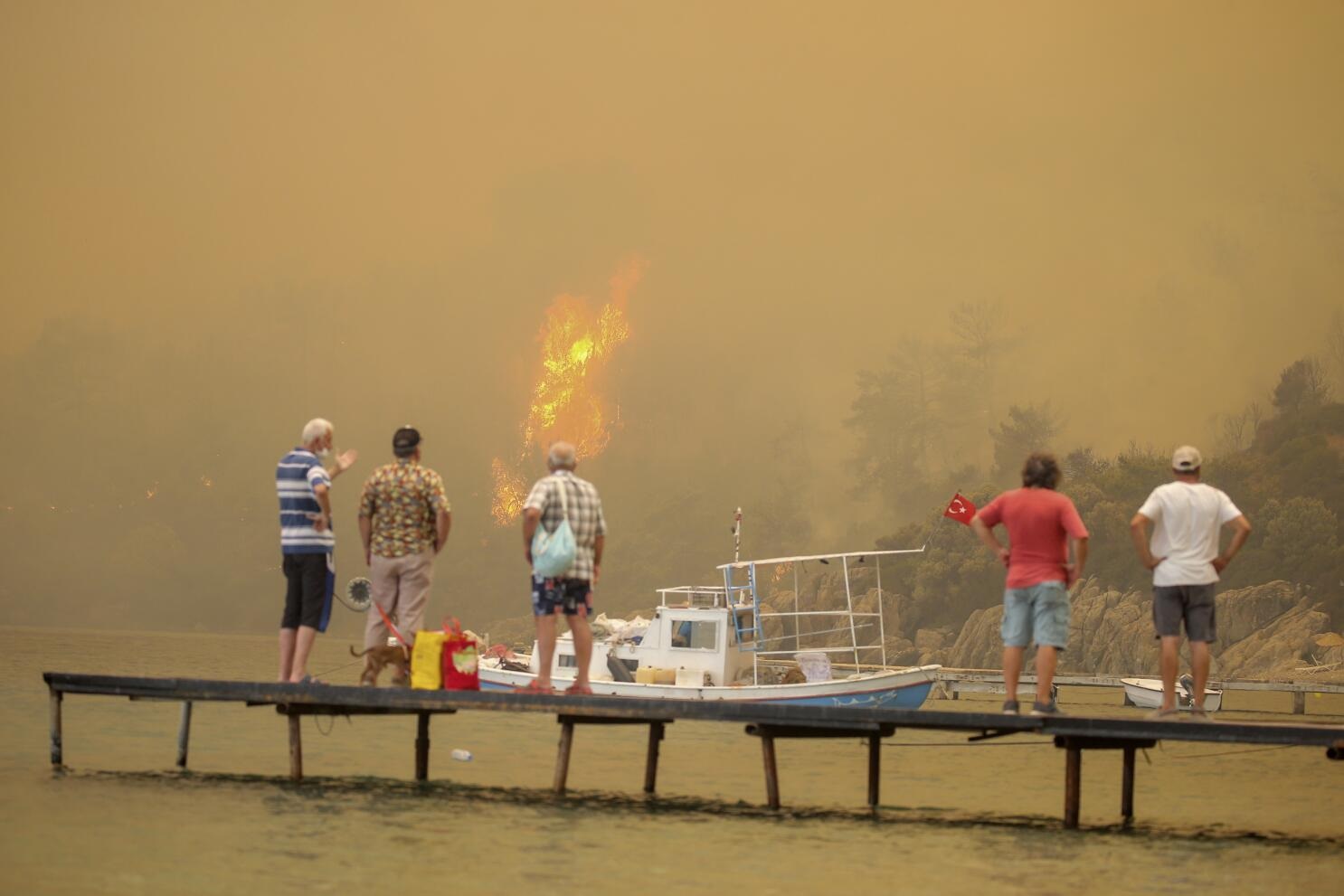News
Heatwave Hell: Fires Rage Toward Turkey’s Cities

Turkey, as of Monday, July 28, 2025, is grappling with a severe wildfire crisis exacerbated by an intense and historic heatwave across the Mediterranean region.
The fires have posed a direct threat to urban centers, including Turkey’s fourth-largest city, Bursa, which lies close to Istanbul, the country’s largest city.
The widespread blazes have forced thousands of evacuations and caused significant damage to forests and infrastructure.
They have also tragically resulted in multiple fatalities among firefighters and rescue workers.
The wildfire emergency began escalating last weekend when a blaze ignited in the forested region between the Gürsu and Kestel districts of Bursa province.
Bursa province is a critical area housing much of Turkey’s automotive industry.
The fire rapidly spread due to unrelenting heat.
Temperatures in the area often surpass 40 degrees Celsius.
Also, and strong winds, forcing the closure of parts of highways connecting Bursa with Istanbul and Izmir.
Massive flames engulfed trees near residential zones, with thick smoke blanketing the city and its surroundings, alarming residents and authorities alike.
Authorities swiftly responded by mobilizing approximately 2,000 firefighters and deploying six firefighting aircraft and four helicopters to combat the blaze in Bursa.
Despite fierce efforts, the fire raged on, necessitating the evacuation of 1,765 residents from the vulnerable Kestel district to safeguard lives.
In the northwestern province of Karabük, another wildfire had been burning uncontrollably for five days, leading to the evacuation of nearly 1,840 villagers across 19 communities.
In this region, firefighting forces employed three planes and 16 helicopters to tackle the flames, yet conditions remained dire amid relentless heat and shifting winds.
Turkey’s Agriculture and Forestry Minister, İbrahim Yumaklı, underscored the precarious nature of the wildfire situation.
Yumakh warned that the crisis was unlikely to subside within a few days.
He described the current period as “perilous times,” pointing to the ongoing heatwave’s role in exacerbating fire risks.
The Turkish Meteorological Service confirmed that record-breaking temperatures had afflicted the country.
According to it, southern and southeastern regions seeing historic highs near 50 degrees Celsius, a first in the nation’s recorded weather history.
The wildfires have inflicted a tragic human toll.
On July 24, a horrific incident in the northwestern province of Eskişehir resulted in the deaths of at least ten firefighters and rescue workers.
They were reportedly trapped by rapidly advancing flames intensified by unpredictable winds.
Among 24 forestry workers caught in the inferno, five workers and five rescuers succumbed to severe burns despite urgent medical attention.
Fourteen others sustained injuries and were hospitalized.
Additionally, the death toll from wildfires near Bursa rose to 17.
This figure came after two volunteer firefighters died in a traffic accident while heading to battle a fire; another firefighter previously died from a heart attack on duty.
These losses have deeply affected local communities and emergency response teams, with officials and citizens expressing profound grief.
Fires in southern provinces like Mersin, Antalya, and the central province of Uşak have been largely contained thanks to sustained firefighting efforts.
On the other hand, the persistent blazes in Bursa and Karabük remain out of control amid extreme heat and dry conditions.
Firefighters continue battling to prevent the fires from reaching more populated areas, posing an ongoing threat to Turkey’s largest urban centers, including Istanbul.
The Turkish government, firefighting services, and local authorities remain on high alert.
It is emphasizing the importance of continued vigilance and community cooperation.
Evacuations and road closures are ongoing to mitigate risks to civilians, alongside intensive aerial firefighting operations.
Meanwhile, the extraordinary heatwave that has set unprecedented temperature records across the region has increased both the intensity and frequency of wildfires.
This wildfire disaster highlights the broader challenges Turkey faces amid climate change.
These include rising temperatures, prolonged drought, and extreme weather patterns are creating conditions ripe for catastrophic fires that threaten both urban populations and vital economic zones.
The combination of record-breaking heatwaves, dry landscapes, and strong winds presents a complex and dangerous firefighting environment.
As of late July 2025, Turkey’s largest city Istanbul has not yet suffered direct wildfire damage.
However, the proximity of the fires to Bursa and the closure of connecting highways underscore the fragility of the situation.
It also underscores the risk of escalation toward major metropolitan areas.
The government’s swift evacuations and deployment of firefighting resources aim to safeguard Istanbul and prevent the wildfires from spreading further.
In conclusion, wildfires fueled by severe heatwaves continue to ravage northwestern Turkey, imperiling cities like Bursa and threatening spillover toward Istanbul.
The death toll among firefighting personnel and volunteers remains sobering, exposing the grave human costs of these blazes.
With meteorologists forecasting continued extreme temperatures, Turkey’s wildfire crisis persists as a complex and urgent emergency.
It is reportedly, one demanding sustained national and international attention, resource mobilization, and climate resilience planning.
For Diaspora Digital Media Updates click on Whatsapp, or Telegram. For eyewitness accounts/ reports/ articles, write to: citizenreports@diasporadigitalmedia.com. Follow us on X (Fomerly Twitter) or Facebook












